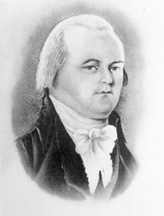Get Today in Masonic History into your Inbox. Sign up today for one of our email lists!
Need an article for your Trestleboard/Newsletter see our Use Policy
Joseph Inslee Anderson is Born

Today in Masonic History Joseph Inslee Anderson was born in 1757.
Joseph Inslee Anderson was an American soldier and politician.
Anderson was born on November 5th, 1757 at White Marsh near Philadelphia Pennsylvania.
In 1776, when the American Revolutionary War began, Anderson enlisted with the 3rd New Jersey Regiment of the Continental Army. Within two years he rose to the rank of captain and paymaster. He fought at the battle of Monmouth and was with the army at Valley Forge during the winter of 1777.
In 1781, Anderson transfered to the 1st New Jersey Regiment and was with them at the Battle of Yorktown.
After the war was over, Anderson retired from the Army as a major. Having studied law before the start of the war, he was admitted to the Delaware bar. He practiced law in Delaware from 1784 to 1791.
In 1791, George Washington appointed Anderson as a judge to the newly formed Southwest Territory, later it became Tennessee. Little is known about the cases he tried during his time as a judge. One of the few surviving cases involved a murder from 1794.
In 1796, Anderson and his father-in-law attended the Tennessee Constitutional convention during the lead up to Tennessee becoming a state. Anderson and his father-in-law put forth three pieces of legislation, all of which were rejected. They included a provision for Tennessee to sever ties with the United States if they were refused statehood, to change from a ballot to a voice vote and establish a unicameral legislature (a single chamber legislature). Anderson swore in the first state legislature later the same year.
In 1797, Anderson was elected by the Tennessee Legislature to fill the United States Senate seat of William Blount who was the first American politician to face impeachment when he conspired with England to drive up land prices by helping England take over the Louisiana territory from the Spanish. Before Anderson could be seated for the senate, he was instead put into the Senate seat vacated by Andrew Jackson. He served in the Senate until 1815. During his time in the Senate he opposed the Alien and Sedition Act, which was put forth by Federalists. It was believed by many the Act was meant to prevent those who opposed the Federalists from being able to vote. He also opposed any Federal intervention on the subject of slavery. He voted in favor of the War of 1812.
After retiring from the Senate, President James Madison appointed Anderson as Comptroller of the United States Treasury. He served in the position from 1815 to 1836.
Anderson passed away on April 17th, 1837.
Anderson was a member of Military Lodge No. 19 of Pennsylvania. During the American Revolution he became a member of Lodge No. 36. After the war he was Senior Warden of Princeton Lodge No.38 in Princeton, New Jersey.
This article provided by Brother Eric C. Steele.

